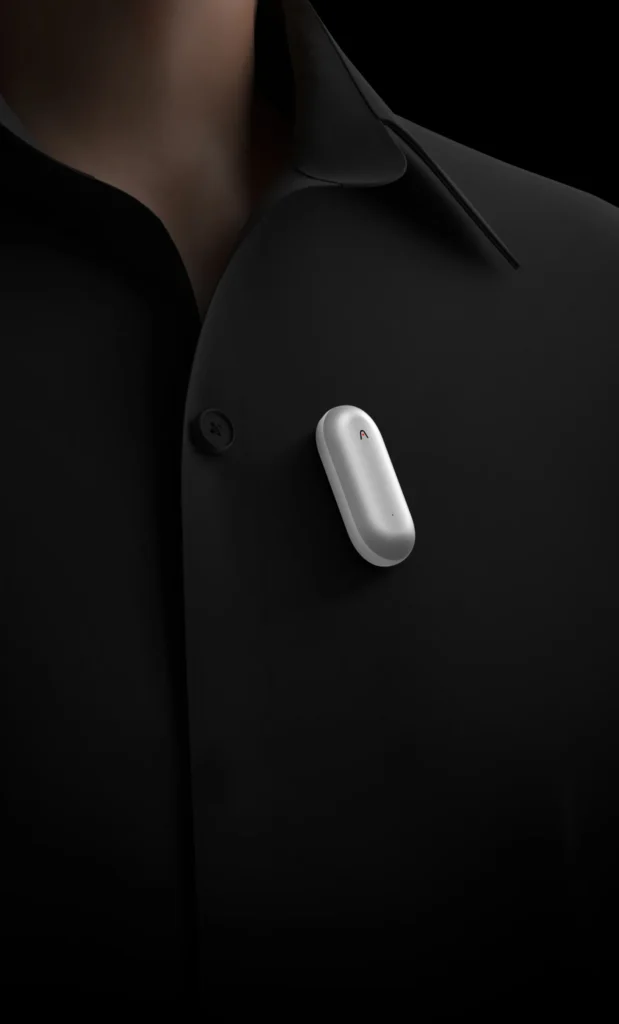If you struggle to remember every detail from incessant business meetings, want to efficiently recall names and faces from endless networking events, or simply need to remember that obscure dog food your veterinarian recommended, there’s a new tech gadget designed precisely for that. Plaud, an AI-focused company, has unveiled the Plaud NotePin, a wearable AI notetaker aimed at helping you catalog your life via transcription.
Building on their previous product, the Plaud Note, a slim ChatGPT-enabled audio recorder that could be attached to a phone or slipped into a pocket, Plaud has now compacted all its capability into a wearable device the size of a lipstick tube. The NotePin can be worn as a necklace, wristwatch, or pin—or it can be easily clipped onto a lapel. Retailing at $169, it allows users to record up to 300 minutes of audio per month. For those who need more, a pro plan priced at $79 annually unlocks 1,200 minutes and additional features, such as speaker-identifying labels in the transcriptions.
While the concept may sound revolutionary, it’s not entirely new. The market has seen a myriad of AI wearables from gadgets like the Humane AI pin to the Rabbit R1, most of which have failed to attract consumer interest. Many early AI devices either didn’t work as advertised, could have been apps instead of hardware, or simply looked unappealing. Even the more promising devices, like Meta’s Ray-Ban smart glasses, have only achieved moderate success, often falling short in functionality compared to a common smartphone.
Yet, companies remain undeterred. Both Plaud and other tech firms like Rewind.AI and Limitless are pushing forward, betting on the potential to make professional lives more efficient and productive. Plaud aims its NotePin squarely at productivity enthusiasts—those who thrive on efficient note-taking, whether they’re business professionals, salespeople, or individuals juggling multiple meetings.
“Most companies innovate with AI using already digitized data on the internet,” said Plaud CEO Nathan Hsu in a press briefing. “But there is so much data in our real-life scenarios—what we say, what we hear, and what we see.”
While transcribing your life sounds like a worthy ambition, the reality of automated transcription is far from perfect. AI speech recognition services frequently misinterpret words, misspell names, and can even generate entirely incorrect sentences. Addressing these limitations, Avijit Ghosh, a policy researcher at the AI company Hugging Face, noted that AI tools often struggle with diverse accents, leading to misunderstandings. Moreover, AI’s tendency to “hallucinate” or generate plausible but incorrect content adds another layer of concern. Depending on these incomplete transcriptions for important decisions can lead to errors or, worse, embarrassment.
Concerns also extend to data security. Though Plaud claims that its cloud-based transcription service is encrypted, the NotePin device itself lacks encryption. Thus, if the device is lost or stolen, unauthorized access to stored recordings is possible, especially if an individual manages to connect it to a computer. Though Plaud has incorporated a proprietary charging connector and a “find my” feature, these measures may not entirely deter determined bad actors.
Hsu acknowledges these potential risks but remains committed to Plaud’s broader vision—where users could record all their daily interactions, creating a comprehensive digital twin over time. “If it always listens to you, it learns you, and over time it gets to know your personality, your preferences, your interactions,” he shared. “Someday, you’re going to be able to utilize AI to reproduce yourself—create this real digital twin.”
However, this all-encompassing vision raises ethical and philosophical concerns. Experts, like Jodi Halpern, a UC Berkeley professor of bioethics, warn about the implications of offloading human responsibilities onto AI. She argues that over-reliance on AI could stifle human development in areas like empathy and social interactions. “If we have a constant feeling that something’s listening and sort of surveilling us, it’s a way to not learn how to be alone with ourselves,” Halpern said.
Whether Plaud NotePin will secure its place in the crowded AI wearable market remains an open question. Despite its compelling use case, it has to compete with countless apps already available on the smartphones people carry daily. “Everything that ChatGPT does, it does worse than something else that was designed to do that thing,” noted Ghosh, highlighting the tech’s current limitations.
In sum, while Plaud NotePin has potential, it faces significant hurdles—both technical and ethical—that could determine whether it truly transforms how we manage our work and personal lives, or just ends up as another gadget in a crowded market.


